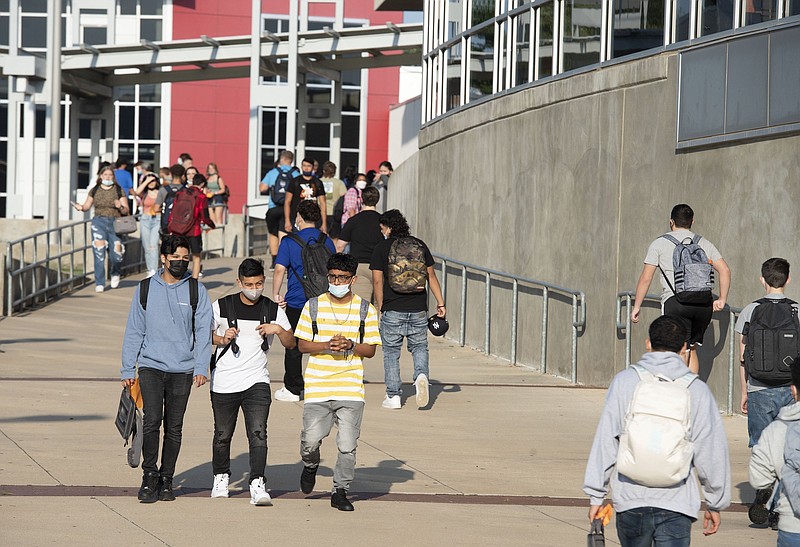ROGERS -- The Rogers School District intends to collect public feedback on the possibility of a nontraditional calendar featuring an earlier start to the school year and more breaks throughout the year.
Administrators and the school board discussed the concept at the October board meeting and again during the board's work session meeting Tuesday.
"The teaching and learning environment has changed dramatically in the last couple of years," Superintendent Jeff Perry told the board. "It is a much more demanding, stressful area. Some teachers feel that breaks throughout the school year may provide an opportunity to recharge batteries and actually plan a little bit better."
There is also concern about how much learning students lose during the traditional summer break, which lasts more than two months, Perry said.
The district's calendar committee is developing a sample "hybrid" calendar, along with a traditional calendar, for community members to review, he said.
This hybrid calendar would have Rogers' school year start four weeks earlier than when most Arkansas school districts start. The four weeks gained from starting early would be placed in the calendar as breaks throughout the year. The school year would still end in late May, Perry said.
The committee will conduct a survey to determine the community's calendar preference. The board likely will not decide on a 2023-24 calendar until January or February, Perry said.
Many parents and teachers already have voiced support for a hybrid calendar, he said.
In a written message to the community Friday, Perry said, "We are fully aware that a hybrid calendar has many advantages, but there are also several disadvantages." He told the board the community would have to be "overwhelmingly" in favor of a hybrid calendar for the district to adopt it.
In recent years, the district has had two elementary schools -- Eastside and Mathias -- that operated on a calendar different from other Rogers schools. Eastside operated for 13 years on a calendar that featured a shorter summer with more breaks throughout the year. The district shifted Eastside back to the traditional calendar in 2019. Mathias Elementary also used a hybrid calendar for several years before dropping it in 2011.
If Rogers shifts to a hybrid calendar, it would be for all schools, Perry said.
The Marion School District in eastern Arkansas is in its second year on a hybrid calendar. The district of 3,800 students started classes this school year on July 25. Marion students get two-week breaks in the fall, winter and spring. The calendar still includes 178 days of instruction, the traditional number for the state.
Hugh Inman, deputy superintendent in Marion, said in December the response the district had received to its calendar was "incredibly positive," according to a news release from the district at the time.
"It's a win-win for everyone involved," Inman said. "It benefits our students' academic progress; it helps our teachers stay refreshed and effective; it gives our maintenance team great opportunities to make sure our facilities remain in top shape."
The main idea behind the hybrid calendar is to ease what educators call the "summer slide," according to the Marion news release, which cited research showing students often lose up to 40% of what they have learned the previous year during long summer breaks.
Still, Rogers administrators and board members on Tuesday shared some concerns about the hybrid calendar.
Jim Davis, assistant superintendent for secondary instruction, said there are unanswered questions about how the calendar change would affect student participation in athletics and the arts. Sharla Osbourn, assistant superintendent for elementary education, said she had some concern about how child care facilities would adapt, as well as where students who normally get free meals at school would eat during the breaks.
Perry mentioned some benefits to the hybrid calendar. For one, he said, school staff members are mandatory reporters of child abuse and neglect. During the traditionally long summer break, schools are not seeing those kids, and the number of reports of child abuse received by authorities plunges.
More frequent breaks throughout the year also may have a positive effect on teacher attendance. A teacher feeling worn out might be less tempted to take a day off knowing a break is coming up soon, he said. That would reduce the district's reliance on substitute teachers, who have become much more difficult to find since the covid-19 pandemic began.

